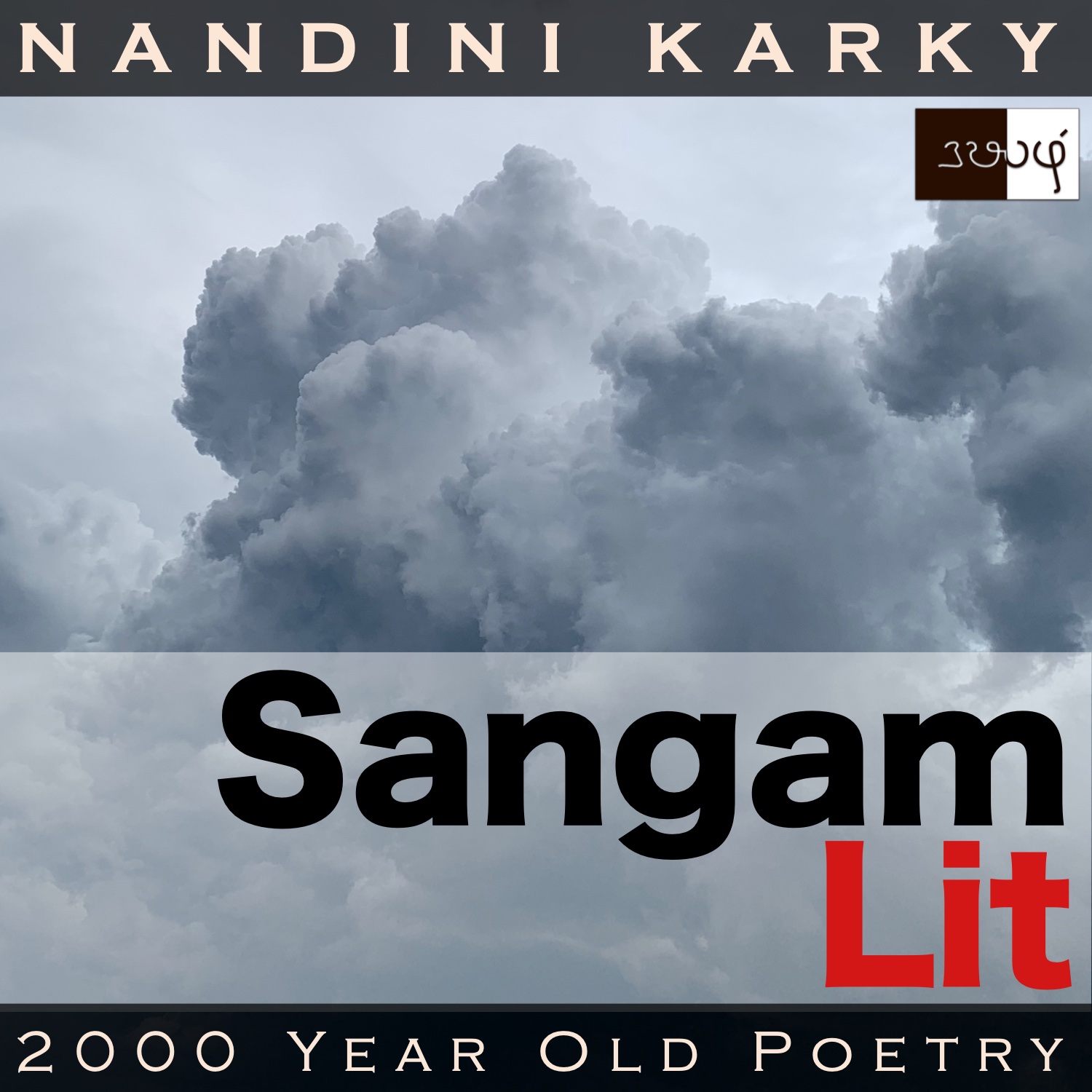Podcast: Play in new window | Download
Subscribe: Apple Podcasts | Spotify | Amazon Music | Android | iHeartRadio | TuneIn | RSS | More

In this episode, we perceive the pain of separation, as portrayed in Sangam Literary work, Natrinai 364, penned by Kidangil Kaavithi Perunkotranaar. The verse is situated in the forest regions of ‘Mullai’ and speaks in the voice of the lady to her confidante, expressing the anguish in her heart at the man’s delay in returning.
சொல்லிய பருவம் கழிந்தன்று; எல்லையும்
மயங்கு இருள் நடு நாள் மங்குலோடு ஒன்றி,
ஆர் கலி வானம் நீர் பொதிந்து இயங்க,
பனியின் வாடையொடு முனிவு வந்து இறுப்ப,
இன்ன சில் நாள் கழியின், பல் நாள்
வாழலென் வாழி-தோழி!-ஊழின்
உரும் இசை அறியாச் சிறு செந் நாவின்
ஈர் மணி இன் குரல் ஊர் நணி இயம்ப,
பல் ஆ தந்த கல்லாக் கோவலர்
கொன்றைஅம் தீம் குழல் மன்றுதோறு இயம்ப,
உயிர் செலத் துனைதரும் மாலை,
செயிர் தீர் மாரியொடு ஒருங்கு தலைவரினே.
Opening with ‘சொல்லிய பருவம் கழிந்தன்று’ meaning ‘the season of promised return has gone by’, the verse establishes the essence of the theme instantly. A succinct weather report appears in the words ‘மங்குல்’ or ‘cloud’, ‘ஆர் கலி வானம்’ or ‘thundering skies’ and ‘பனியின் வாடை’ or ‘cold, northern winds’, revealing it’s the season of rains. The phrase ‘சிறு செந் நாவின் ஈர் மணி இன் குரல்’ meaning ‘the sweet voice of the red and small-tongued, moist bell’ reveals intricate details about the colour and make of bells then. ‘பல் ஆ தந்த கல்லாக் கோவலர்’ talks about ‘young cowherds who take numerous cattle grazing’ and reveals a primary occupation of the region. Sweet music rises from the phrase ‘கொன்றைஅம் தீம் குழல்’ meaning ‘the sweet pipe of the golden shower tree’, sketching for us, how the long, tube-like fruits of the tree have been fashioned into musical instruments of then! ‘துனைதரும் மாலை’ reveals the time of the day for it means ‘evening that renders suffering’. The verse ends with ‘செயிர் தீர் மாரியொடு ஒருங்கு தலைவரினே’ meaning ‘arriving as one with the timely and faultless rains’ and invites us to get soaked in this meaning of this song.
The man and lady had been leading a love relationship and the time came for the man to part with the lady to gather wealth towards their wedding. When he leaves, he promises the lady that he would be back before the rains. Days pass by and one day, the lady turns to her confidante and says, “The promised season is past; Merging as one with the clouds, midday appears with the confusing darkness of midnight; Skies, filled with water, pour down, echoing with thunder; In the company of cold northern winds, suffering seems to tighten around me. If a few more days were to go on like this, I shall not live for long, O friend! Not knowing how to speak with the harshness of thunder, the small, red tongue of the moist bell, makes its sweet voice soar in town. The young cowherds, who take a great many cattle grazing, play on the sweet pipe of the ‘kondrai’ fruit, and spread music all around town. Such is the evening hour, which seems to torment my life to part from me, when it joins hands and arrives as one, with these faultless rains!” With these words, the lady gives expression to the pain in her heart, as she’s assailed by the elements around.
Time to delve into the nuances! The lady comes straight to the point, talking about how the time the man promised to be back is past. This reiterates the inference that a lady then could do nothing but wait for her man to return. Imagine the trust on the part of the lady and the honour on the part of the man to make such a relationship work! Continuing, the lady gives tangible proof for why she says the season is past. She points to the gathering clouds and how they seem to turn day into night under the darkness of their cover. From the clouds, she turns to the sounds of thunder in the skies and how they seem to descend down as rain. Thereafter, she turns to the third crucial element in the rainy season, which is the cold wind from the northern lands. The lady then captures her own situation by mentioning how these elements seemed to bind her with the rope of misery!
Expressing how there is no way that she can bear if the situation were to continue, she even declares that her life may part. The lady continues her tale of woe saying it’s not only the elements of the weather that seem to affect her, adding how the town bells send out their clear music and how the cowherds too play on the fruit pipes of the ‘Kondrai’, as they bring the cattle home. These events mark it’s the evening hour in that land, a time of intense pain for separated lovers. The lady feels this deeply and says the evening seems to fill her with so much anguish, driving away her very life, when it arrives in the company of those faultless rains. The lady characterises the time of day and the season as partners in crime when it comes to attacking her happiness. The lady does seem to be in a fragile situation, suffering as if her life would part and yet, the fact that she is talking out these words to a friend and giving form to that amorphous anxiety within through her words, there is hope that she will survive this ordeal. Indeed, no better cure for a suffering-filled heart than clear words and a concerned listener!




Share your thoughts...